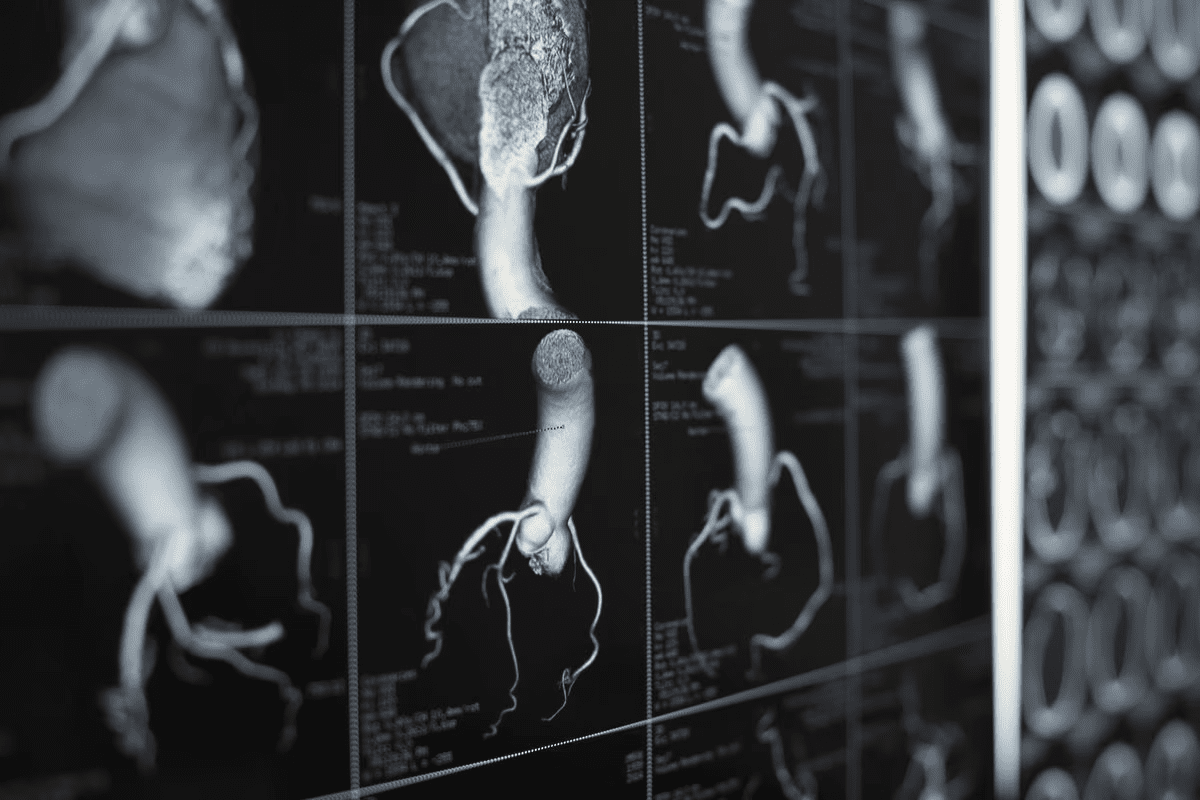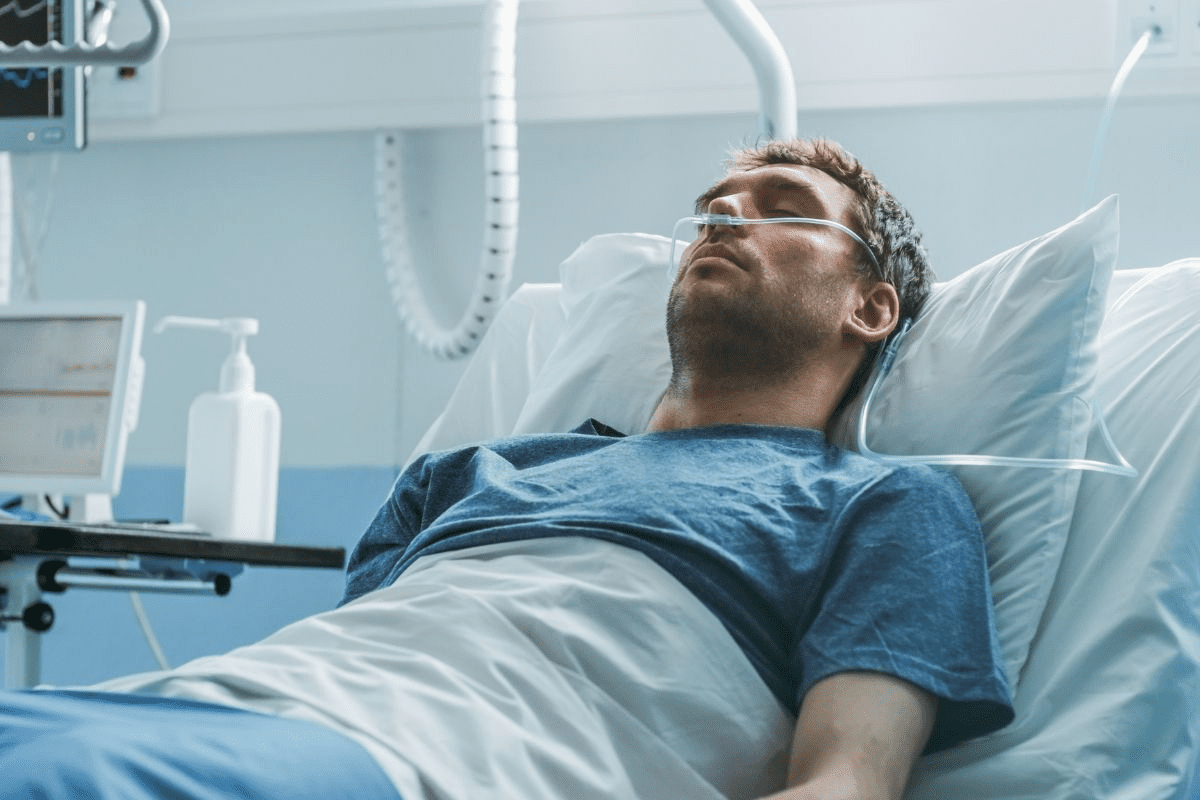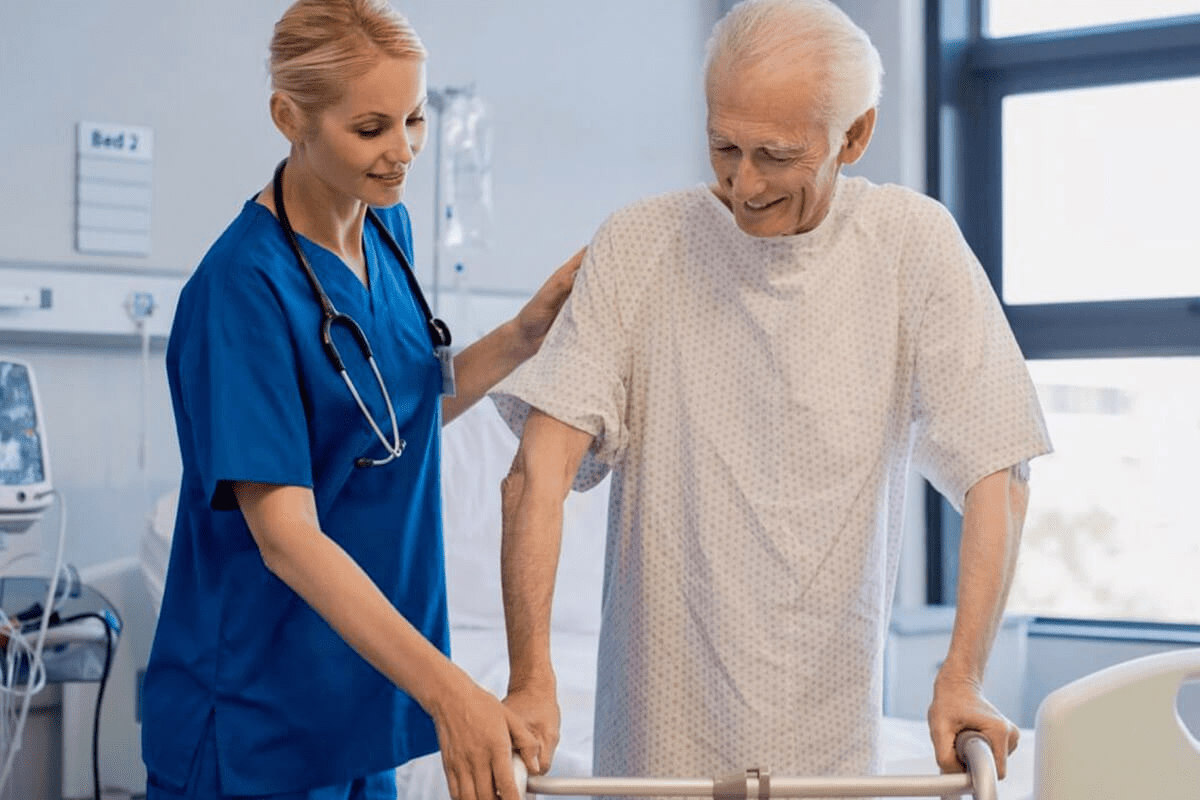Last Updated on November 27, 2025 by Bilal Hasdemir
When symptoms in the abdomen are puzzling, a CT scan is often a key tool. It’s quick, doesn’t hurt, and is very accurate. At Liv Hospital, we use top-notch methods and focus on the patient. This makes every step fast and comfortable.
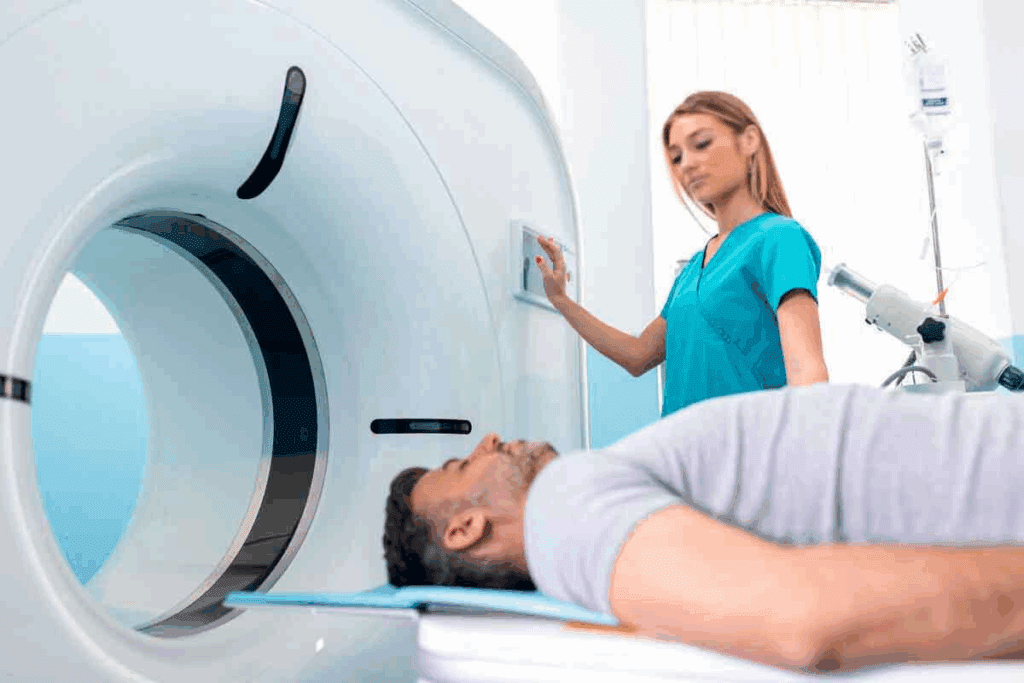
Knowing how long a CT scan of the abdomen takes and what it shows is important. A CT scan usually takes about 30 minutes from start to finish. The actual scan is often done in just 10 minutes or less.Find out how long does a neck CT scan take. Our best and ultimate guide provides powerful information and amazing tips on what you can expect.
Key Takeaways
- A CT scan of the abdomen is a relatively quick procedure.
- The total time spent at the medical facility is approximately 30 minutes.
- The actual scanning process typically lasts around 10 minutes or less.
- Liv Hospital follows internationally benchmarked protocols for accuracy and comfort.
- Patients are guided through every step from check-in to completion.
Understanding the CT Scan Time Frame for Abdominal Imaging
Knowing how long a CT scan of the abdomen takes can ease your worries. Several things affect how long you’ll be at the medical facility for this scan.
We’ll look at the average time and what can change it. Usually, you’ll spend about 30 minutes for a CT scan of the abdomen.
The 30-Minute Average Total Duration
A CT scan of the abdomen usually takes about 30 minutes. This includes getting ready, the scan itself, and any extra steps needed.
Key factors that contribute to the 30-minute average include:
- Initial preparation and check-in
- Administration of contrast dye (if required)
- The actual CT scanning process
When Scans Might Take Up to 60 Minutes
Scans can sometimes take up to 60 minutes. This happens when there’s extra preparation or complex procedures.
Factors that may prolong the visit include:
- The need for contrast dye administration
- Additional imaging requirements
- Complex patient conditions require extra preparation
Comparing CT Scan Speed to Other Diagnostic Methods
CT scans are faster than many other imaging methods. They quickly help diagnose problems in the abdomen, making them a key tool in medicine.
Understanding what affects the time of a CT scan helps patients prepare. It also tells them what to expect during their visit.
The Step-by-Step Process of an Abdominal CT Scan
We’ll guide you through the abdominal CT scan process. This ensures you’re informed and comfortable every step of the way.
Check-in and Initial Preparation
When you arrive, you’ll check in at our reception. Our staff will help you with the paperwork and prep. Preparation often means fasting for a few hours before the scan, so follow your healthcare provider’s instructions closely. You might also need to drink fluids for the contrast dye.
Wearing comfortable, metal-free clothing is also recommended. This helps avoid any issues with the imaging technology.
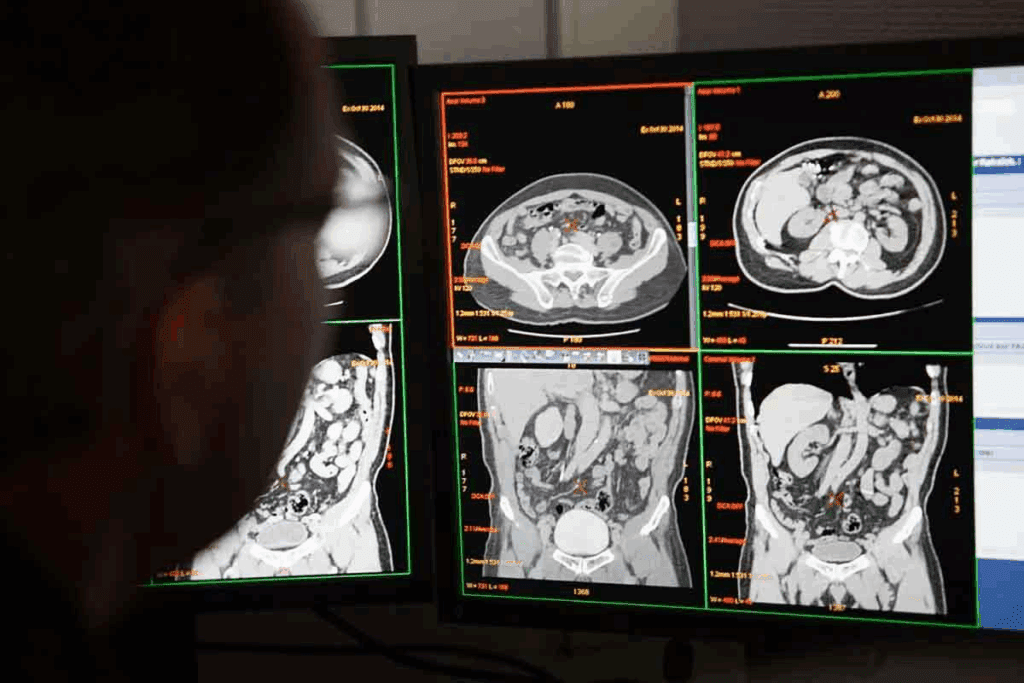
The Actual 10-Minute Scanning Experience
The scanning itself is quick, usually taking 10 minutes or less. You’ll lie on a table that slides into the CT scanner. Our radiology team will talk to you through an intercom, making sure you’re comfortable and informed.
The scanner will move around you, capturing detailed images of your abdomen. It’s important to remain still for clear images.
Post-Scan Procedures
Once the scan is done, you’ll go to a recovery area. Our staff will give you post-scan instructions, including when to resume normal activities and eating. You might feel a metallic taste or nausea from the contrast dye, but these side effects usually go away quickly.
Knowing the steps of an abdominal CT scan can ease your anxiety. Our team is here to support you at every step.
What an Abdominal CT Scan Can Visualize
A CT scan of the abdomen is a powerful tool for checking the health of organs inside your belly. It helps find any problems or diseases in these vital areas.
Major Abdominal Organs Captured
The main goal of an abdominal CT scan is to see the big organs in your belly. These include:
- The liver, which cleans your blood and helps with metabolism.
- The pancreas, which makes enzymes and hormones like insulin.
- The kidneys filter waste and keep your fluids balanced.
- The intestines (both small and large), important for digestion and nutrient absorption.
- The bladder, where urine is stored until you go to the bathroom.
These organs are shown in great detail. Doctors can see their size, shape, and health. This helps them find problems like tumors, cysts, and inflammation.
Does a CT Scan of the Abdomen Show Lungs?
An abdominal CT scan mainly looks at the belly organs. But it might also show the lower parts of the lungs. Yet, lung details are not as clear as in a chest CT scan. So, if you have lung concerns, a chest CT scan is better for a detailed look.
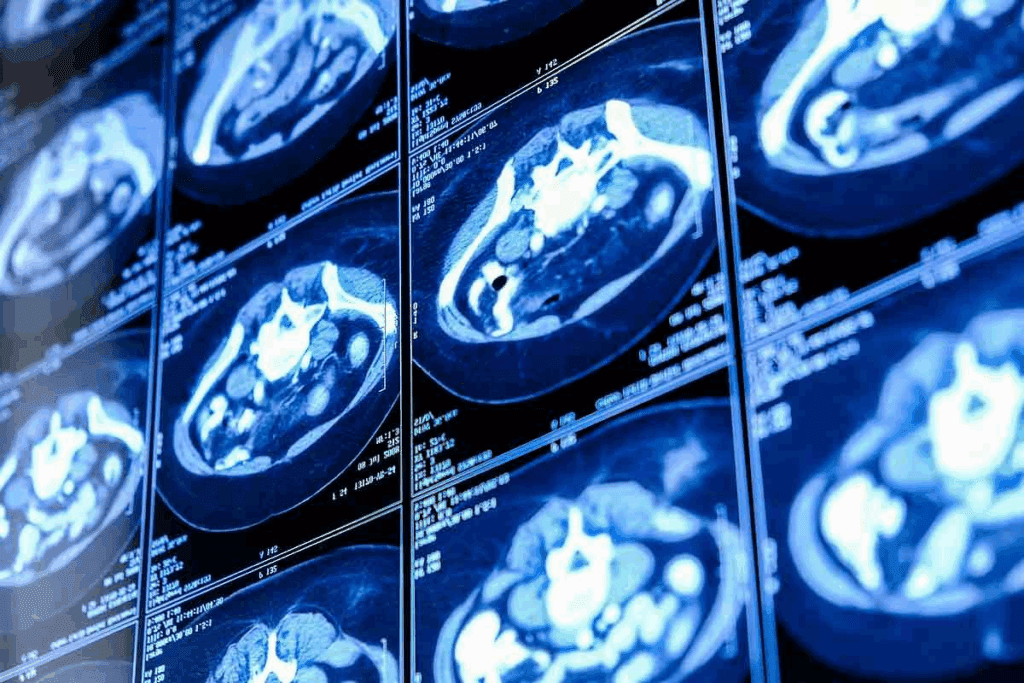
Resolution and Detail Level of CT Images
The CT scan technology gives high-resolution images for a close look at the belly organs. It can spot small issues, like minor injuries or early disease signs. This detail is key for biopsies and other procedures, making them safer and more accurate.
In short, an abdominal CT scan is a great tool for seeing the main organs in your belly. It might show some lung details, but it’s not a full lung scan. For detailed lung images, a chest CT scan is best.
Common Conditions Diagnosed Through Abdominal CT Scans
CT scans of the abdomen use high-resolution imaging to find many conditions. These can be sudden, ongoing, or linked to cancer. Knowing what a CT scan can show is key for the right diagnosis and treatment.
Acute Conditions
Acute abdominal issues need quick medical help. CT scans are great for spotting:
- Appendicitis: Inflammation of the appendix, which can be life-threatening if not treated promptly.
- Kidney Stones: Small, hard mineral deposits that can cause severe pain and potentially lead to complications if not managed properly.
These problems show up with severe symptoms. A CT scan quickly gives doctors the info they need to act fast.
Chronic Disorders
Chronic abdominal issues can really affect a person’s life. CT scans help manage and find:
- Inflammatory Bowel Disease (IBD): Conditions like Crohn’s disease and ulcerative colitis which cause chronic inflammation of the gastrointestinal tract.
- Liver Disease: Various conditions affecting the liver, including cirrhosis and fatty liver disease, which can be detected and monitored through CT scans.
CT scans give detailed views of the organs. This lets doctors see how bad these conditions are and plan treatments.
Cancer Detection and Staging
Abdominal CT scans are key in finding and staging cancers in the abdomen. This includes:
- Colorectal Cancer: CT scans can spot tumors in the colon and rectum.
- Pancreatic Cancer: Detailed images can show tumors in the pancreas.
- Liver Cancer: Both primary liver cancer and metastases to the liver can be detected.
The info from a CT scan is crucial for knowing how far cancer has spread. It helps plan treatments like surgery, chemotherapy, or radiation.
Healthcare providers use abdominal CT scans to make accurate diagnoses and provide effective treatments for many conditions.
Preparing for Your Abdominal CT Scan
To make your CT scan smooth and efficient, preparation is key. We’ll guide you through the steps to prepare for your abdominal CT scan. This way, you’ll be well-informed and comfortable during the process.
Fasting and Dietary Guidelines
You might need to fast for a few hours before your CT scan. This is especially true if you’re having a scan with contrast dye. Following the fasting instructions from your healthcare provider is crucial for the best images.
Do not eat or drink anything for a few hours before the scan if instructed to do so.
- Stay hydrated by drinking clear liquids during the fasting period, if allowed.
- Avoid consuming foods or drinks that could interfere with the scan, such as those containing barium.
Clothing and Accessory Recommendations
Wear comfortable, loose-fitting clothing for your CT scan. Avoid clothing with metal parts, like zippers or buttons, as they can interfere with the scan. You might need to change into a hospital gown for the best images.
- Choose clothing that is easy to remove and put back on.
- Remove any jewelry, glasses, or other metal objects before the scan.
- Leave any unnecessary personal items at home or with a companion.
Contrast Dye: Administration and Additional Time Requirements
If your CT scan needs contrast dye, it will be given through an IV line. This adds about 15-30 minutes to your appointment time. The dye highlights certain areas of your abdomen, giving more detailed images.
By following these preparation guidelines, your abdominal CT scan will be efficient and effective. It will cause minimal disruption to your daily routine. If you have any questions or concerns, ask your healthcare provider.
Conclusion: What to Expect After Your Scan
After a CT scan of the abdomen, most people can go back to their usual activities. The scan time, usually between 30 to 60 minutes, is just part of the process. Knowing what to expect after the scan is key for a smooth recovery and to address any concerns.
Once the scan is done, you might need to wait a bit for the images to be checked. Sometimes, more imaging or procedures are needed. We’ll help you through any follow-up appointments or procedures, making sure you get the care and support you need.
The results of your CT scan will give you important insights into your health. They can help diagnose or monitor conditions in your abdominal organs. Our team is dedicated to supporting you from start to finish, from preparation to follow-up care. If you have questions about the scan time or what to expect afterward, we’re here to help.
FAQ
How long does a CT scan of the abdomen typically take?
A CT scan of the abdomen usually takes about 30 minutes. This includes from check-in to when it’s all done. The actual scan itself takes around 10 minutes or less.
Are there cases where the CT scan of the abdomen takes longer than expected?
Yes, sometimes it can take up to 60 minutes. This is more likely if they need to use contrast dye or if extra preparation is needed.
What can a CT scan of the abdomen visualize?
It mainly looks at big organs in the belly. This includes the liver, pancreas, kidneys, intestines, and bladder.
Does a CT scan of the abdomen show the lungs?
Sometimes, the scan might catch a glimpse of the lungs. But the lungs are not the main focus. The scan doesn’t show them as clearly as a chest CT scan would.
How do I prepare for a CT scan of the abdomen?
You’ll need to fast for a few hours before. Drink lots of fluids. And wear comfy, metal-free clothes.
Can I resume normal activities after the CT scan?
Yes, most people can go back to their usual activities after the scan.
What conditions can be diagnosed through abdominal CT scans?
These scans can spot many issues. This includes appendicitis, inflammatory bowel disease, kidney stones, and some cancers in the belly.
How long does it take to get the results of a CT scan of the abdomen?
Getting results can take different amounts of time. But we usually share them as soon as we can. This is often within a few hours or the next day, depending on how urgent it is and the radiologist’s schedule.
What is the role of contrast dye in a CT scan of the abdomen?
Contrast dye makes some parts of the belly more visible. It helps doctors get clearer images and make more accurate diagnoses.
References:
- Brenner, D. J., & Hall, E. J. (2007). Computed Tomography — An Increasing Source of Radiation Exposure. New England Journal of Medicine, 357(22), 2277–2284. https://pubmed.ncbi.nlm.nih.gov/18046031/



